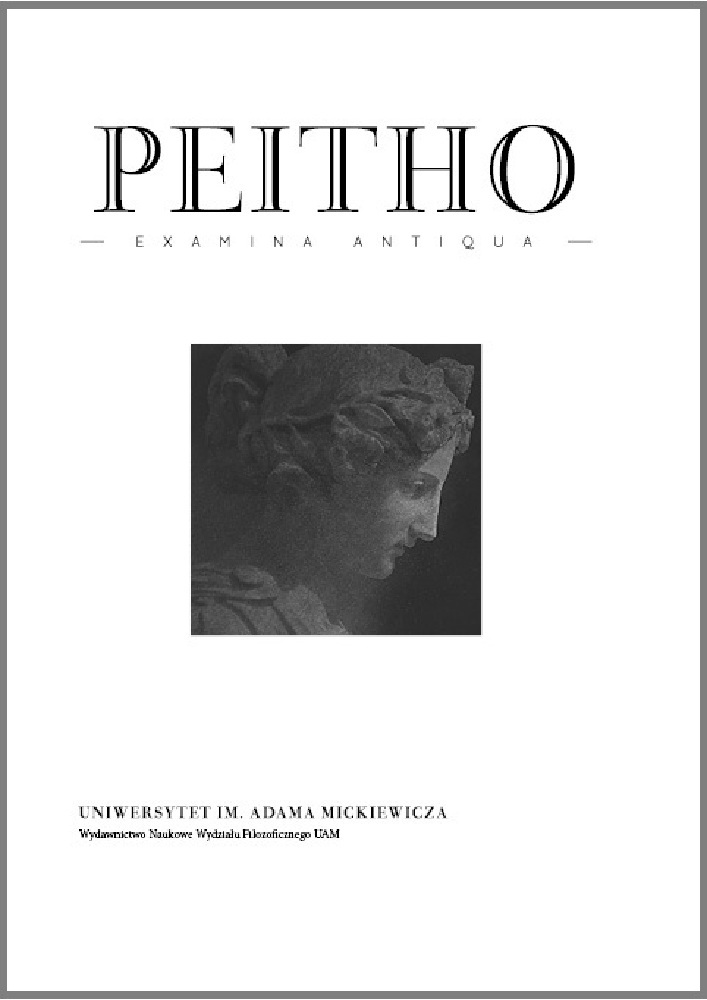Abstract
Epicurus’ philosophy grew out of his life experiences, contacts, polemics, journeys and other activities. Apart from such great works as the monumental On nature (Peri phuseôs) in 37 books, Epicurus authored also various extracts (epitomai), principle doctrines, sayings and letters. The letters, while addressed to many students and friends, were for him a very important tool of propagating his own philosophy. Epicurus’ fascinating Letter to Menoeceus can be regarded as a manifesto of his philosophy of life. In historiography, it is often characterized as an exposition of his ethics, even though Epicurus probably did not use the term himself. To better capture the composition and spirit of this work, the Greek text of the letter has been somewhat rearranged here: for the sake of clarity, ample spaces and special paragraphs have been provided, and appropriate headings have been introduced in the Polish translation.
References
Arrighetti, G., 19732, Epicuro Opere, Torino.
Bollack, J. (ed.), 1985, Il pensiero del piacere: Epicuro, testi morali, commentari, Genova.
Diogenes Laertios, 1968, Żywoty i poglądy słynnych filozofów, tłum. I. Krońska, K. Leśniak, W. Olszewski, Warszawa.
Diogenes Laertius, 2013, Lives of Eminent Philosophers, T. Dorandi (ed.), Cambridge.
Hammerstaedt, J., Smith, M. F., 2014, The Epicurean Inscription of Diogenes of Oinoanda. Ten Years of New Discoveries and Research, Bonn.
Hessler, J. E., 2014. Epikur: Brief an Menoikeus, Basel (ważny komentarz).
Isnardi Parente, M. (cur.), 19832, Epicuro. Opere, Torino.
Kubiak, Z., 1999, Literatura Greków i Rzymian, Kraków, s. 277–281.
Long, A. A., Sedley, D., 1987, The Hellenistic Philosophers, 2 vol., Cambridge.
Ramelli, I., 2002, Epicurea: Testi di Epicuro e testimonianze epicuree nell’edizione di Hermann Usener, Milano.
Usener, H., 1887, Epicurea, Leipzig.
Bignone, E., 1936, L’Aristotele perduto e la formazione filosofica di Epicuro, Firenze.
Gagliarde, G., 2011, “L’Epicuro breve”, Appunti Romani di Filologia 13, s. 69–87.
Gigandet, A., Marie Morel, P. (eds.), 2007, Lire Épicure et les épicuriens, Paris.
Hadot, P., 2000, Czym jest filozofia starożytna?, tłum. P. Domański, Warszawa.
Krokiewicz, A.,1961, Hedonizm Epikura, Warszawa.
Mitsis, Ph., 1988, Epicurus’ Ethical Theory: The Pleasures of Invulnerability, Ithaca NY.
Németh, A., 2017, Epicurus on the Self, London.
Nussbaum, M., 1994, The Therapy of Desire. Theory and Practice in Hellenistic Ethics, Princeton.
Pąkcińska, M., Hedonistyczna etyka Epikura, Warszawa 1959.
Pawłowski, K., 2015, Epikur z Samos. Listy oraz wybór świadectw, Warszawa.
Pawłowski, K., Lathe biosas. Żyj w ukryciu. Filozoficzne posłannictwo Epikura z Samos, Lublin 2007.
Pesce, D., 1980, Introduzione a Epicuro, Bari.
Porawski, R., Wesoły, M., 1988, „Arystotelesa Protreptyk czyli zachęta do filozofii”, Symbolae Philologorum Posnaniensium 7, s. 51–73
Silvestre, M. L., 1985, Democrito e Epicuro: il senso di una polemica, Napoli.
Verde, F., 2013. Epicuro. Roma.
Warren, J. (ed.), 2009, The Cambridge Companion to Epicureanism, Cambridge.
Wesoły, M., 1988, „Epikureizm rzymski a Lukrecjusz”, Symbolae Philologorum Posnaniensium 7, s. 91–111.
Wesoły, M., 2016, „Ethos w filozofii helleńskiej”, Ethos 114, s. 86–107.
Wesoły, M., 2018, „Księga Arystotelesa o dyspozycjach dianoetycznych (intelektualnych). Etyka nikomachejska VI”, w: Filozofia Publiczna i Edukacja Demokratyczna, 7, (w druku).
License
Peitho provides immediate open access to its content on the principle that making research freely available to the public supports a greater global exchange of knowledge.
